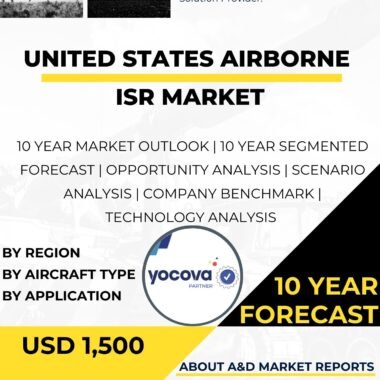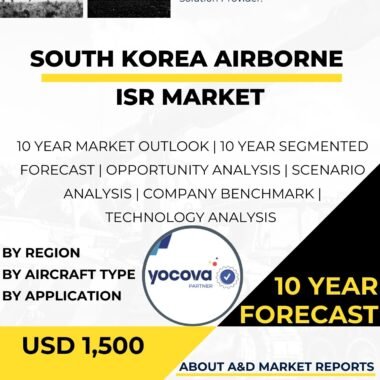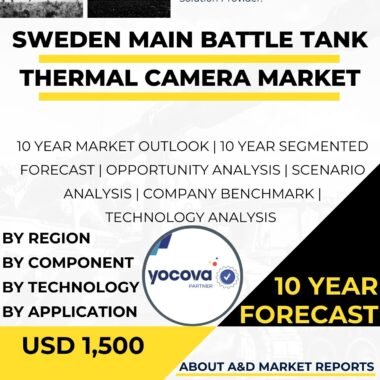Description
France Airborne ISR Market
The airborne Intelligence, Surveillance, and Reconnaissance (ISR) market in France is a crucial aspect of the country’s defense and security capabilities. As a leading player in the global defense market, France has been actively involved in the research, development, and deployment of advanced airborne ISR systems to support a wide range of military and security operations. This essay provides an overview of France’s airborne ISR market, focusing on its significance, key players, technology advancements, applications, international collaborations, policy considerations, and future prospects. The significance of France airborne ISR market lies in its potential to provide comprehensive and real-time information for decision-making, situational awareness, and operational planning. Airborne ISR platforms are equipped with a variety of sensors, cameras, and communication equipment to gather and transmit critical data from the air, providing invaluable intelligence and reconnaissance capabilities to support military missions and homeland security operations.
Key players in France’s airborne ISR market include government entities, defense companies, and research institutions. The French Ministry of Armed Forces and its industry partners have been at the forefront of research, development, and deployment of airborne ISR systems. These players have harnessed cutting-edge technologies and expertise to produce state-of-the-art ISR platforms that meet the stringent requirements of modern defense and security missions.
Technological advancements have been pivotal in shaping the growth of France’s airborne ISR market. Innovations in sensor technology, data processing, and communication systems have significantly improved the performance, range, and accuracy of airborne ISR platforms. Additionally, the integration of artificial intelligence and machine learning algorithms has enhanced the systems’ ability to analyze and interpret vast amounts of data, enabling quicker and more accurate intelligence assessments.
The applications of airborne ISR systems are diverse and essential in modern defense and security operations. One of the primary applications is in supporting military operations, including surveillance, reconnaissance, and target acquisition. Airborne ISR platforms can gather critical data on enemy movements, terrain conditions, and potential threats, allowing military commanders to make informed decisions and develop effective strategies.
Furthermore, airborne ISR systems play a crucial role in border and coastal surveillance, where they monitor and track illegal activities, human trafficking, and smuggling. These platforms provide persistent surveillance capabilities, covering vast areas and maritime regions, which is vital for maintaining national security.
In addition to military applications, airborne ISR systems are utilized in civil and commercial sectors. For instance, they can be used for disaster monitoring and response, environmental surveillance, and search and rescue operations.
France’s airborne ISR market has also benefited from strategic international collaborations. The country has engaged in partnerships with other nations and defense industries to share technological expertise, collaborate on joint research and development programs, and facilitate the exchange of knowledge and resources. Such collaborations have strengthened France’s defense relationships and expanded the market reach for its airborne ISR systems.
Policy considerations play a significant role in shaping France’s airborne ISR market. The country adheres to international regulations and standards concerning the use, export, and transfer of defense equipment, including airborne ISR systems. Additionally, national policies prioritize data privacy, safety, and operational effectiveness, driving continuous improvement in the quality and capabilities of these systems.
Looking ahead, the future prospects of France’s airborne ISR market are promising. As the security landscape continues to evolve, the demand for advanced ISR capabilities will likely increase. The French government’s commitment to modernizing its defense and security capabilities will drive the demand for airborne ISR systems.
However, challenges remain for the market. One such challenge is the need for continuous research and development to stay ahead of evolving threats and improve the performance of airborne ISR platforms. As adversaries develop new tactics and technologies, France must continue to invest in cutting-edge research to ensure its ISR systems remain at the forefront of innovation.
Moreover, ensuring interoperability and coordination among different airborne ISR platforms and ground-based systems can be a challenge. Effective integration and data sharing between sensors and intelligence centers are essential to achieve seamless surveillance and enhance the overall effectiveness of airborne ISR operations.
To address these challenges and seize opportunities, France’s airborne ISR market must focus on continuous research and development. Emphasizing the integration of advanced sensors, data processing algorithms, and artificial intelligence will enable the production of more efficient and effective airborne ISR platforms.
In conclusion, France airborne ISR market is a critical component of its defense and security capabilities, providing valuable intelligence, reconnaissance, and surveillance capabilities. Key players, technological advancements, applications, international collaborations, policy considerations, and future prospects all contribute to the market’s growth and significance. The future prospects of the market are promising, driven by the increasing demand for advanced airborne ISR systems to address evolving security challenges. By maintaining its focus on innovation and collaboration, France can continue to strengthen its position as a leading player in the global airborne ISR market.




